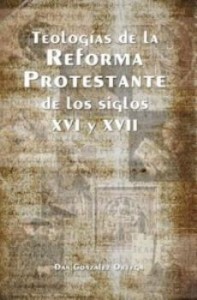The Rev. Dan González Ortega presented his book, Theologies of the Protestant Reformation of the XVI and XVII Centuries, at the Gonzalo Báez-Camargo Methodist Seminary in Mexico City on Oct. 21. The book is published by the Editorial Casa Unida de Publicaciones S.A. (CUPSA).
“We are on the eve of the 500th anniversary of what has been called the ‘The Reformation of the XVI century.’ This religious movement within the Western Christian church is above all identified with the emblematic figure of Dr. Martin Luther who, on October 31, 1517, lit a flame difficult to imagine how far it would illumine,” says González in the introduction to his book.
According to González, the Roman Catholic Church is today seriously considering the remembering of Luther and “his reformation” 500 years later, and there is even talk of the possibility of revoking the “papal bull” that marks the moment of rupture of the Western Christian church as a result of Luther’s being excommunicated.
“It is in this context that in Latin America we will also celebrate the Protestant Reformation and a way… my way of beginning to ‘to stir up the fire,” is to recognize that Luther did not, and could not have brought about this reforming undertaking alone. Many women and men accompanied the process and it was they carried it in such a way that it had the impact that transformed Europe, identified North America and influenced the rest of the world from the Christian perspective,” says González.
In his book, he analyzes the contributions of: Argula von Stauff, Andreas Bodenstein zu Karlstadt, Thomas Müntzer, Huldrych Zwingli, Melchior Hoffmann, Ubbe Philipps, Ursula Weyda, Jean Cauvin M.V.D., Katharina Schütz Zell and Susanna Annesley.
The Protestant Reformation was never univocal, underlines González, and for that reason he prefers to speak of the “Protestant Reformations,” or of those “Theologies of the Protestant Reformation of the XVI and XVII centuries.”
“From the outset these articles were thought of more as a reminder to be placed on the table of simple readers, rather than as texts emanating out of a profound investigation,” González recognizes, indicating the kind of text and the language that the readers will find when reading.
“I am only a pastor who wants to transmit to the average Protestant churchgoers in Mexico — and perhaps Latin America — his memoirs about persons that contributed richly with their words, reflections and perspectives to the building of a richly diverse Protestantism,” concludes González in his introduction.

